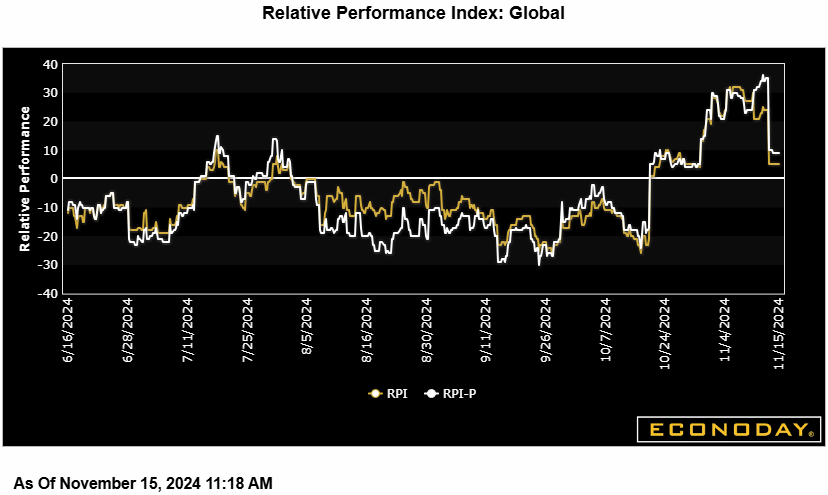Econoday’s Relative Economic Performance Index (RPI) lost some ground last week but, at 8, still shows global economic activity running a little ahead of market forecasts. The U.S., Eurozone and Japan are all modestly outperforming expectations while the UK, Canada and Switzerland struggle to keep up.
In the U.S., October inflation offered no surprises but the RPI (19) and RPI-P (20) both edged a little higher. Economic activity in general continues to outpace expectations, prompting forecasters to adopt a more cautious view of future Federal Reserve easing.
In Canada, September manufacturing sales fell by less than anticipated. However, at minus 17, both the RPI and RPI-P remain in negative surprise territory and leave economic fundamentals still pointing to another cut in Bank of Canada interest rates in December.
In the Eurozone, the RPI (13) and RPI-P (1) held above zero but, courtesy of fresh weakness in manufacturing activity, only just. That said, while the real economy is essentially matching expectations, recent inflation data have surprised on the upside, making a 25 basis point cut by the European Central Bank next month more likely than a 50 basis point move.
In the UK, third quarter output was surprisingly soft, leaving both the RPI (minus 20) and RPI-P (minus 24) sub-zero for a third straight week. This keeps alive the possibility of another reduction in Bank Rate in December but Wednesday’s October CPI update will be more important.
In Switzerland, the Swiss National Bank pointed out that further monetary easing is not a done deal. However, with the RPI sliding to minus 35, the RPI-P to minus 25 and the latest inflation data again unexpectedly soft, another cut in the policy rate in December will be hard to avoid.
In Japan, third quarter growth matched expectations but October pipeline inflation was unexpectedly firm and the RPI (16) and RPI-P (12) both ended the period showing overall economic activity slightly stronger than expected. With forecasters still uncertain about the timing of the next central bank tightening, Bank of Japan Governor Kazuo Ueda’s address on Monday will be a key market focus this week.
In China, following a month of data surpassing expectations, the RPI eased to exactly zero, meaning that forecasters have caught up with recent signs of tentative economic recovery. As part of a broader easing package, the People’s Bank of China cut its prime loan rates aggressively earlier this month and investors will be looking closely for additional signs that economic activity in general, and prices in particular, are now on the way up.
Econoday’s RPI provides a handy summary measure of how an economy has recently been evolving relative to market expectations.
A reading above zero means that the economy in general has been performing more strongly than expected and vice versa for a reading below zero. The closer is the value to the maximum (+100) or minimum (-100) levels, the greater is the degree to which markets have been under- or over-estimating economic activity. A zero outturn would imply that, on average, the market consensus has been correct. Note too that the index is sensitized to place extra weight upon those indicators that investors consider to be the most important.


 Econoday’s Global Economics articles detail the results of each week’s key economic events and offer consensus forecasts for what’s ahead in the coming week. Global Economics is sent via email on Friday Evenings.
Econoday’s Global Economics articles detail the results of each week’s key economic events and offer consensus forecasts for what’s ahead in the coming week. Global Economics is sent via email on Friday Evenings. The Daily Global Economic Review is a daily snapshot of economic events and analysis designed to keep you informed with timely and relevant information. Delivered directly to your inbox at 5:30pm ET each market day.
The Daily Global Economic Review is a daily snapshot of economic events and analysis designed to keep you informed with timely and relevant information. Delivered directly to your inbox at 5:30pm ET each market day. Stay ahead in 2025 with the Econoday Economic Journal! Packed with a comprehensive calendar of key economic events, expert insights, and daily planning tools, it’s the perfect resource for investors, students, and decision-makers.
Stay ahead in 2025 with the Econoday Economic Journal! Packed with a comprehensive calendar of key economic events, expert insights, and daily planning tools, it’s the perfect resource for investors, students, and decision-makers.